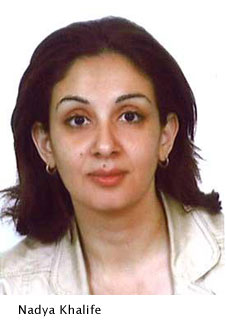International Women's Day this week gave women in the Middle East a
chance to review some significant achievements. In rebuttal, Nadya Khalife says
too many governments in the region restrict a wide spectrum of women's
rights.
 (WOMENSENEWS)--This week started off with worldwide
observations of March 8, International Women's Day, a time to recognize women's
social, economic and political achievements.
(WOMENSENEWS)--This week started off with worldwide
observations of March 8, International Women's Day, a time to recognize women's
social, economic and political achievements.
Women in the Middle East had some reason to partake in the celebrations.
Egypt and Yemen in 2003 and Algeria in 2005 granted women equal rights to
nationality, meaning that spouses and children are recognized as citizens and
are able to enjoy state benefits they had been denied. In 2009, Jordan withdrew
reservations on freedom of movement and choice of residence. Morocco in 2008
said it intends to remove all its reservations to the U.N. treaty requiring it
to eliminate gender discrimination. If it keeps its promise, this could provide
significant momentum for women's rights in the region.
We can, however, only hold a partial celebration in the Middle East as we
contemplate numerous stubborn barriers.
Laws in Jordan, Syria and Lebanon still provide reduced sentences for
murderers of female relatives who claim family "honor" if victims have been
caught in an "illicit" sexual act.
In Yemen and Saudi Arabia, no minimum age exists for marriage, depriving
thousands of girls of their childhood, undermining their right to an education
and leaving them to face physical and sexual abuse and life-threatening risks
from too-early pregnancies.
Most governments in the region--including Libya, Bahrain, Kuwait, Egypt and
the United Arab Emirates--do not have laws to protect women from domestic
violence. Women are not encouraged to report abuses to police; if they do, they
are almost never taken seriously.
Follows CEDAW's 30th Anniversary
This year's International Women's Day is especially important, following the
30th anniversary in December of the Convention on the Elimination of All Forms
of Discrimination Against Women, or CEDAW. The treaty has been ratified by the
vast majority of nations, including nearly all in the Middle East and North
Africa. Iran alone in the region has not ratified it.
But even though most of our governments ratified the treaty, many have made
numerous formal "reservations" about carrying out its requirements to end
discrimination in education, health and all aspects of public and private
life.
Governments have excused themselves from amending discriminatory laws, from
providing for equality in marriage and from allowing a woman to pass on her
nationality to her children.
It is particularly important for governments to eliminate discrimination
against women in the so-called private sphere.
Governments need to reform the personal status laws that govern the daily
lives of millions of women in the region, including marriage and divorce,
custody and guardianship and inheritance, and make sure that they conform to
international standards of equality.
Freedom in Marriage and Divorce
In a region in which so many women and young girls are
pressured to marry someone chosen by their families and in which there is so
much violence against them, it is critically important for them to be able to
make decisions freely about entering into marriage and to have equal rights to
divorce.
Mothers should have equal rights to custody of their children and be able to
make decisions in the best interest of the child, a right that is still almost
exclusively afforded to fathers.
Women need to be protected from all forms of violence and to know they can
seek redress. That means repealing numerous provisions in penal laws that
sanction the murder of women and girls, which is still too often seen as a
private matter. The same is true of protecting them from rape or any other form
of abuse in marriage.
Women can now start looking forward to next year--March 8, 2011--and hope by
then for greater cause for celebration.
This will occur if our governments take urgent steps to meet their
commitments under the treaty to end discriminatory policies and to promote
women's human rights.
Otherwise, the treaty will remain a piece of paper instead of a beacon of
hope.
Nadya Khalife is the Middle East and North Africa researcher in the
Women's Rights Division at Human Rights Watch. She has a Master of Arts degree
in gender and cultural studies from Simmons College in Boston and a Bachelor of
Arts in international relations from Virginia Wesleyan College.

